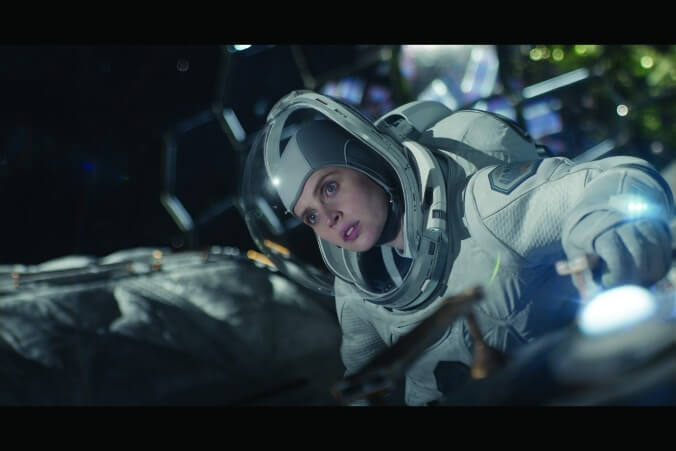There was a time when George Clooney felt like the last traditional movie star: a reliable grown-up presence working in a variety of genres, often with marquee filmmakers, sometimes opting (like Eastwood, Costner, Redford, and so many others before him) to direct himself. Today, that whole apparatus feels decidedly old-fashioned. A star coming into prominence in his mid-30s? Apologizing for playing a superhero once, rather than doing it six more times? It’s practically science fiction, to the point where Clooney casting himself as the last man on Earth in his new movie The Midnight Sky feels like a particularly fitting, almost on-the-nose act of meta-vanity.
Technically, Augustine, the scientist played by Clooney in his first starring vehicle in four years, isn’t the true last man standing after a global apocalypse in the year 2049. The movie takes place just three weeks after what it refers to as “the event,” explaining only that it involves massive air contamination and hardly anywhere to hide from it. After an opening scene that teases genuine All Is Lost-style austerity at an Arctic observatory, a flashback shows Augustine opting to stay behind as helicopters full of people set off for safety that is far from guaranteed (and, the movie later suggests, temporary at best). He has some kind of terminal diagnosis seemingly unrelated to the contamination, and decides to bide his time at the base, alone.
Clooney the director, however, bails on Arctic desolation pretty quickly, intercutting the story of a spaceship returning from a mission to assess the livability of a recently discovered moon orbiting Jupiter. The crew, including Tom (David Oyelowo), Sully (Felicity Jones), Maya (Tiffany Boone), Sanchez (Demián Bichir), and Mitchell (Kyle Chandler), has no idea that they’ve left what may be the only immediately habitable environment in the solar system. Back on Earth, Augustine encounters a child (Caoilinn Springall) hiding in the base. Curious and persistent, she’s a believable kid character in every way but the precocious silence that movies often lend to children when they want to avoid the messy, unpredictable business of actual preteen emoting. Her stoicism comes in handy when Augustine realizes the ship is heading for Earth and decides to head out through the treacherous Arctic landscape, kid in tow, to another base with a better chance of reaching them.
So The Midnight Sky is two survival movies that should fit neatly together as one. The division between the astronauts and the ground team is a familiar structure, here given one clever reversal: The crew aboard the ship is relatively robust, while mission control is one guy with a radio and his mute sidekick. Yet somehow these parallel adventures don’t fall into any real rhythm; the balance keeps shifting uncomfortably. After a long stretch of cutting back and forth, the story of Augustine and his surrogate parenting gets an awkwardly extended pause while the spaceship portion of the movie straps in for a big set piece.
The astronaut-drama stuff isn’t top-tier within the recent annual tradition of sending stars to the stars, but it does the job. Clooney seems to take his cues from the folks who have directed him, and while it’s hard not to miss the days when he was cribbing from Steven Soderbergh circa Confessions Of A Dangerous Mind, his workmanlike imitation of Alfonso Cuarón beats the curdled Coens-ana of his last directorial feature. (And it’s less expected to boot; he’s never really chased this kind of big-budget thrill before.) Suburbicon also tried to tell two stories at once, to woeful effect; this time, the jagged shape of the thing somehow becomes more compelling as it goes, methodically narrowing its dramatic options as the ship approaches its ruined home.
Maybe the movie simply recovers from the flashbacks and occasional dream sequences that slow its momentum early on. (Though, in classic dopey-flashback fashion, they’re revealed to serve a single-minded purpose later on). Ethan Peck is called on to deliver exposition as a younger Augustine—seemingly (and distractingly) dubbed by an altered version of Clooney’s voice. In these moments, Clooney clutters up his own fine work as an actor. He’s festooned with a bushy mustache and beard that bring out a certain lonely frogginess in his eyes; Soderbergh, who famously did his best to disabuse the star of his actorly tics for Out Of Sight, would be proud. Behind the camera, his best moments here are impressionistic: Arctic wolves barely visible through blurs in a snowstorm and a tense scene with floating droplets of blood are more effective than the overworked Alexandre Desplat score.
Gradually, Midnight Sky becomes a nailbiter—not over the fate of the Earth or the astronauts so much as whether its two storylines will coalesce into something more meaningful. Somewhat surprisingly, they do (though others’ mileage may vary even more than usual). In the final stretch, some of the movie’s odd pieces—Augustine’s interiority; the light characterizations of the astronauts; the adventure stories without clear next steps—snap together for perhaps the most nakedly emotional passage of Clooney’s directing career. It’s almost a stranger movie than the filmmakers seem to realize, which gives it a bittersweet edge. In some other alternate timeline, maybe this lumpy, affecting film would be received as another movie-star triumph. Here and now, it’s even more of an anomaly than Clooney himself.









![HBO teases new Euphoria, Larry David, and much more in 2026 sizzle reel [Updated]](https://img.pastemagazine.com/wp-content/avuploads/2025/12/12100344/MixCollage-12-Dec-2025-09-56-AM-9137.jpg)































